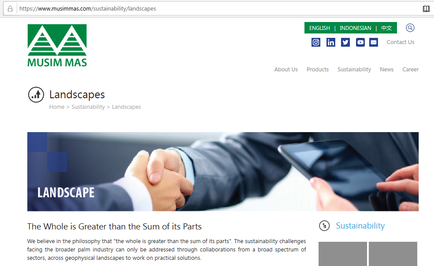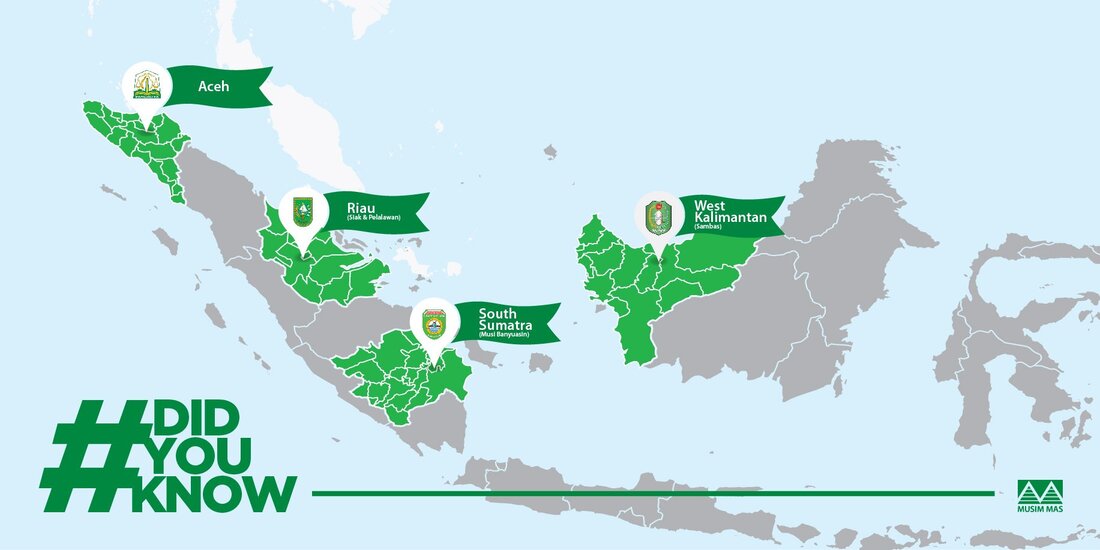Traceability only a First Step towards Sustainability for Musim Mas
Musim Mas Group, a Singapore based palm oil company, will be able to trace its supply of palm oil completely some time this year. According to a press statement shared by Food Navigator Asia, the company will be able to trace all of its palm fruits from company owned mills down to the small farmer in Indonesia.
Full traceability is an important feature for responsible sourcing as it is the only way to know supply impacts on the environment. Indeed, many palm oil producers and users use this feature as an end goal to the “sustainability” of its supply chain and stop there. The reason why they stop there is that there is a high risk of brand exposure once the supply chain reaches beyond the mills. Skeletons of forests or displaced communities could easily challenge the popular definition of “certified sustainable palm oil” once they are exposed.
Full traceability is an important feature for responsible sourcing as it is the only way to know supply impacts on the environment. Indeed, many palm oil producers and users use this feature as an end goal to the “sustainability” of its supply chain and stop there. The reason why they stop there is that there is a high risk of brand exposure once the supply chain reaches beyond the mills. Skeletons of forests or displaced communities could easily challenge the popular definition of “certified sustainable palm oil” once they are exposed.
 Screenshot from Musim Mas wesbite
Screenshot from Musim Mas wesbite
Musim Mas appears to be challenging itself by reaching so far down into the supply chain. Musim Mas’s director of sustainable supply chain, Olivier Tichit, dismisses the importance of supply chain traceability in the Food Navigator article as “ Traceability alone will not deliver sustainability.”
This is a bold acknowledgement on the part of Musim Mas that the traceability of its palm oil supply is only a part of what it considers as the overall sustainability of the company’s product.
A screenshot of Musim Mas’s website from March 31, 2020 further supports its message that:
“Landscape. The Whole is Greater than the Sum of its Parts.”
The drive for landscape impact rather than the easy out of certified plantations and mills could be the reason why Musim Mas, in its latest report to the Roundtable on Sustainable Palm oil (RSPO) answered most of the questionnaire with a simple N/A (Not Applicable).
A request for more information from Musim Mas to provide information on the direction it has set to accomplish “The Whole” in its mission for sustainability in palm oil has received a reply that it will be forthcoming in July 2020 when it publishes its Sustainability Report. Meantime, an exploration of the information which the company has published on its website shows what might be in its mission.
This is a bold acknowledgement on the part of Musim Mas that the traceability of its palm oil supply is only a part of what it considers as the overall sustainability of the company’s product.
A screenshot of Musim Mas’s website from March 31, 2020 further supports its message that:
“Landscape. The Whole is Greater than the Sum of its Parts.”
The drive for landscape impact rather than the easy out of certified plantations and mills could be the reason why Musim Mas, in its latest report to the Roundtable on Sustainable Palm oil (RSPO) answered most of the questionnaire with a simple N/A (Not Applicable).
A request for more information from Musim Mas to provide information on the direction it has set to accomplish “The Whole” in its mission for sustainability in palm oil has received a reply that it will be forthcoming in July 2020 when it publishes its Sustainability Report. Meantime, an exploration of the information which the company has published on its website shows what might be in its mission.
An in-depth look at Riau province ( one of the biggest palm oil producing regions in Indonesia ) is declared on the web page as “a priority province for the implementation of our sustainability commitments.” The targets for its sustainability goals have been established through a diagnostic report compiled by a group of experts including Daemeter, Proforest and Rainforest Alliance.
In other key supply regions, Musim Mas shows a 2017 diagnostic report prepared by Rainforest Alliance which stated the report’s goal as:
“Musim Mas announced its sustainability policy in December 2014 to bring benefits to the community; to promote positive environmental impacts; to fully comply with local, national, and international laws; and to establish a traceable supply chain.”
The final bit of information with public access from Musim Mas is on its impact in Aceh province. Aceh province, once a hotspot for an armed independence struggle, is a region popularly portrayed by foreign groups as “the last place on earth where orangutans, tigers and elephants” are found. The presence of these iconic animals of Indonesian biodiversity in Aceh provinces’ part of the Leuser Ecosystem has made it an extremely sensitive region for the Indonesian palm oil industry’s image.
This is where simple issues like the gazettement of an area for a national park becomes embroiled in the sustainability of palm oil from Aceh. Environmental groups have challenged the sustainability of Indonesian palm oil by highlighting supply sources in protected forests which is a deplorable act as they well know, some of these protected areas were settled and farmed long before they were gazetted as protected forests.
Musim Mas, as one of many palm oil companies with supplies from Aceh province does not expect to have all the solutions and stated that:
“The common thread to the issues is a systemic one concerning the need for long term spatial land use planning to balance socio-economic and environmental needs.”
This is indeed the challenge for the image of sustainable palm oil from Indonesia where the popular narrative on its sustainability does not acknowledge the developmental needs of rural Indonesians.
As the last frontier for palm oil development takes place in Papua province, the lessons learnt by Musim Mas in Aceh will provide clear paths on what needs to be done to produce palm oil from Indonesia, sustainably.
The big question that remains is, will the buyers of Musim Mas’ palm oil have any interest in a product that protects biodiversity and supports Indonesia’s drive towards the UN’s Sustainable Development Goals?
Musim Mas is listed as a supplier to consumer goods manufacturers like FrieslandCampina which has set the year 2025 as the target to source supplies from “sustainably managed sources.” As one of the largest oil palm plantation owners with an operational presence in thirteen countries including Europe and North America, there is no doubt that Musim Mas can successfully produce a better model of sustainable palm oil and have it widely available to European and North American buyers. The key question is whether consumer goods companies will support it or cause Musim Mas to violate the essence of sustainability: over-producing a product for which there is no demand.
Published April, 2020. CSPO Watch
In other key supply regions, Musim Mas shows a 2017 diagnostic report prepared by Rainforest Alliance which stated the report’s goal as:
“Musim Mas announced its sustainability policy in December 2014 to bring benefits to the community; to promote positive environmental impacts; to fully comply with local, national, and international laws; and to establish a traceable supply chain.”
The final bit of information with public access from Musim Mas is on its impact in Aceh province. Aceh province, once a hotspot for an armed independence struggle, is a region popularly portrayed by foreign groups as “the last place on earth where orangutans, tigers and elephants” are found. The presence of these iconic animals of Indonesian biodiversity in Aceh provinces’ part of the Leuser Ecosystem has made it an extremely sensitive region for the Indonesian palm oil industry’s image.
This is where simple issues like the gazettement of an area for a national park becomes embroiled in the sustainability of palm oil from Aceh. Environmental groups have challenged the sustainability of Indonesian palm oil by highlighting supply sources in protected forests which is a deplorable act as they well know, some of these protected areas were settled and farmed long before they were gazetted as protected forests.
Musim Mas, as one of many palm oil companies with supplies from Aceh province does not expect to have all the solutions and stated that:
“The common thread to the issues is a systemic one concerning the need for long term spatial land use planning to balance socio-economic and environmental needs.”
This is indeed the challenge for the image of sustainable palm oil from Indonesia where the popular narrative on its sustainability does not acknowledge the developmental needs of rural Indonesians.
As the last frontier for palm oil development takes place in Papua province, the lessons learnt by Musim Mas in Aceh will provide clear paths on what needs to be done to produce palm oil from Indonesia, sustainably.
The big question that remains is, will the buyers of Musim Mas’ palm oil have any interest in a product that protects biodiversity and supports Indonesia’s drive towards the UN’s Sustainable Development Goals?
Musim Mas is listed as a supplier to consumer goods manufacturers like FrieslandCampina which has set the year 2025 as the target to source supplies from “sustainably managed sources.” As one of the largest oil palm plantation owners with an operational presence in thirteen countries including Europe and North America, there is no doubt that Musim Mas can successfully produce a better model of sustainable palm oil and have it widely available to European and North American buyers. The key question is whether consumer goods companies will support it or cause Musim Mas to violate the essence of sustainability: over-producing a product for which there is no demand.
Published April, 2020. CSPO Watch

